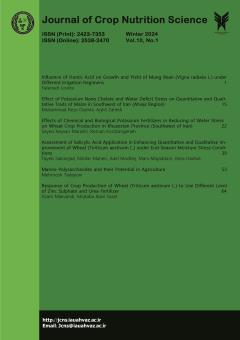Effect of Potassium Nano Chelate and Water Deficit Stress on Quantitative and Qualitative Traits of Maize in Southwest of Iran (Ahvaz Region)
Subject Areas : Journal of Crop Nutrition Science
Mohamad Reza Dadnia
1
*
![]() ,
Aghil Zahedi
2
,
Aghil Zahedi
2
1 - Assistant Professor, Department of Agronomy, Ahvaz Branch, Islamic Azad University, Ahvaz, Iran.
2 - PhD Student, Department of Agronomy, Ahvaz Branch, Islamic Azad University, Ahvaz, Iran.
Keywords: Chlorophyll, Corn, Irrigation, Nutrition, Yield,
Abstract :
BACKGROUND: Innovations for saving water in irrigated agriculture and thereby im-proving water use efficiency are of paramount importance in water-scarce regions. Conven-tional deficit irrigation is one approach that can reduce water use without causing signifi-cant yield reduction. OBJECTIVES: The purpose of this study was to evaluate the effects of different irriga-tion regimes and Potassium nano chelate on effective traits on Corn crop production under the Mediterranean climatic conditions in Southwest of Iran. METHODS: Current research was done according split plot experiment based on com-pletely randomized block design at 2022. So the water deficit at three level [60 (control), 90 and 120 mm evaporation from class A evaporation pan] in main plots, and potassium nano chelate at three levels [0 (control), 2 and 4 kg.ha-1) in sub plots. RESULT: Significant difference in growth parameters was observed between water defi-cit and commercial fertilizer (potassium) treatments. Potassium chelate recorded higher yields relative to water deficit with similar 2 and 4 kg.ha-1 rates, though statistically signifi-cant. Yield deficiency was observed in maize at controlled potassium application. Yield components, showed both K and water deficiencies in 7th week, while control treatments showed K deficiency in 14th week by potassium chelate at low application rates. CONCLUSION: The agronomic optimal rate of potassium Chelate determined by evaporation pan function were found to be higher than that of 90 mm evaporation that was found to enhance growth and yields of crops potentially have greater benefits such as improving soil health and plant resilience.
An, T., Q. Kuang, Y. Wu, Y. Gao, Y. Zhang, B. S. Mickan, B. Xu, X. Deng, S. Zhang, Y. Min. and Y. Chen. 2023. Variability in stress tolerance among four maize genotypes: Impacts on plant physiology, root morphology, and chlo-roplast microstructure. Plant Physiol. Bioch. 108-135.
https://doi.org/10.1016/j.
Bitarishvili, S., A. Dikarev, E. Ka-zakova, E. Bondarenko, A. Prazyan, E. Makarenko, D. Babina, M. Podobed. and S. Geras’kin. 2023. Growth, antioxidant system, and phy-tohormonal status of barley cultivars contrasting in cadmium and water defi-cit tolerance. Environ. Sci. Pollut. Res. Intl. 30: 59749-59764.
https://doi.org/10.1007/s11356-023-26523- 2.
Bucker-Neto, L., A. L. S. Paiva, R. D. Machado, R. A. Arenhart. and M. Margis-Pinheiro. 2017. Interactions between plant hormones responses. Genet. Mol. Biol. 40: 373-386.
https://doi.org/10.1590/1678-4685-GMB-2016-0087.
Cheng, Y., L. Qiu, P. Shen, Y. Wang, J. Li. Z. Dai, M. Qi, Y. Zhou. and Z. Zou. 2023. Transcriptome studies on cadmium tolerance and potassium miti-gating water deficit stress in muskmel-on. Plant Physiol. Biochem. 197. 107661.
https://doi.org/10.1016/j. plaphy.2023.107661.
Coskun, D., R. Deshmukh, H. Sonah, J. G. Menzies, O. Reynolds, J. F. Ma, H. J. Kronzucker. and R. R. B´elanger. 2019. The controversies of silicon’s role in plant biology. New Phy-tol. 221: 67-85.
https://doi.org/10.1111/nph.15343.
Dutta, S., M. Mitra, P. Agarwal, K. Mahapatra, S. De, U. Sett. and S. Roy. 2018. Oxidative and genotoxic damages in plants in response to abiotic stress and maintenance of genome sta-bility. e1460048. Plant Signal. Behave.
13.
https://doi.org/10.1080/ 15592324.2018.1460048.
Edgar, O. N., J. P. Gweyi-Onyango. and N. K. Korir. 2017. Plant row spac-ing effect on growth and yield of maize (Zea mays L.) in Western Kenya. Arch. Curr. Res. Int. 7: 1-9.
Farooq, M. A., A. Detterbeck, S. Clemens. and K. J. Dietz. 2016. Sili-con-induced reversibility of oxygen tox-icity in rice. J. Exp. Bot. 67: 3573-3585.
https://doi.org/10.1093/jxb/erw175.
Fu, S., Y. Lu, X. Zhang, G. Yang, D. Chao, Z. Wang, M. Shi, J. Chen, D. Y. Chao, R. Li, J. F. Ma. and J. Xia. 2019. The gene transporter is required for stress tolerance in maize. J. Exp. Bot. 70: 5909-5918.
https://doi.org/10.1093/jxb/erz335.
Karuku, G. N., J. W. Kimenju. and H. Verplancke. 2017. Farmers' perspec-tives on nutrients factors limiting toma-to production and yields in Kabete, Kiambu County, Kenya. East Afr. Agri. Forest. J. 82: 70–89.
Mauel, C. P., M. Ingmar, J. Abra-ham. and C. M. Alberto. 2009. Meth-ods for estimating lettuce evapotranspi-ration in greenhouse conditions in the central zone of Chile. Chil. J. Agric. Res. 69(1): 60–70.
https://doi.org/10.4067/S0718-58392009000100008.
Qiu, W., T. Xu, X. Li, Y. Zhang, R. H. Ren, Q. Heng, W. Chen, S. Zhang, M. Wang, L. Kou, Y. Jiang, C. Cui, W. Dou, K. Li, H. Dong, L. Zhang, H. He, Y. Chen, J. Fan. and Y. Zhang. 2022. The influence of phosphorus on leaf function, oxygen accumulation and stress tolerance of maize leaves under water deficit exposure. Environ. Exp. Bot. 204.
https://doi.org/10.1016/j.envexpbot.2022.105087.
Shoals, M. 2012. Kenya Fertilizer As-sessment. In Support of The African Fertilizer and Agribusiness Partnership (AFAP).
http://ifdcorg.files.wordpress.com/2016/05/kenya-fertilizer-assessment-ifdc-2012.
pdf Available 5th June 2019.
Sun, C., X. Liang, X. Gong, H. Chen, X. Liu, S. Zhang, F. Li, J. Zhao. and J. Yi. 2022. Comparative transcriptom-ics provide new insights into the mech-anisms by which foliar silicon alleviates the effects of water deficit exposure in rice. J. Environ. Sci. 115: 294-307. https://doi.org/10.1016/j.jes.2021.07.03.
Vaculík, M., A. Z. Luxov´, B. Bokor, M. Martinka, D. K. Tripathi. and A. Lux. 2020. Alleviation mechanisms of water deficit stress in plants by silicon: a review. J. Exp. Bot. 71: 6744-6757. https://doi.org/10.1093/jxb/eraa288.
Xiao, Z., M. Ye, Z. Gao, Y. Jiang, X. Zhang, N. Nikolic. and Y. Liang. 2022. Water deficit reduces oxygen-induced suberization by inhibiting the uptake and transport of aluminum in maize roots and consequently promotes root growth. Plant Cell Physiol. 63: 340-352.
Zhang, X., W. Xue, C. Zhang, C. Wang, Y. Huang, Y. Wang, L. Peng. and Z. Liu. 2023. Oxygen pollution to selectivity loss of glutamate receptor channels for permeation of Ca2+/Mn2+/Fe2+/Zn2+ over Cd (2+) in rice plant. J. Hazard. Mater. 452: 131342.

